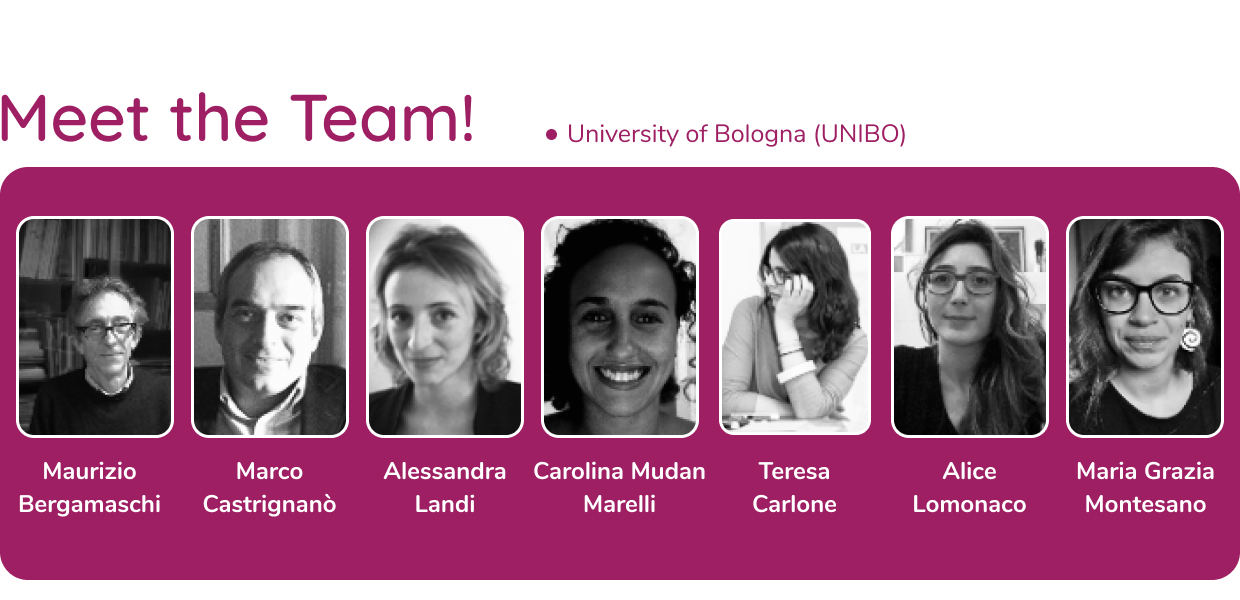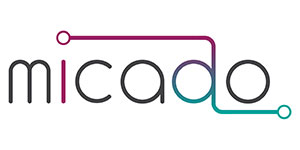
02 Jun Meet the Team – University of Bologna (UNIBO)
Meet the team interview
Almost 1000 years old, the University of Bologna (UNIBO) is known as the oldest university of the western world. Nowadays, UNIBO remains one of the most important institutions of higher education across Europe and the second-largest university in Italy with 11 Schools and 33 Departments. The Department of Sociology and Business Law (SDE) moves from a long tradition of sociological, law, and economic studies at the national and international levels, playing an important role in the national and international academic debate. Specific attention is paid on European and international comparative perspectives about the analysis of policies, services, and measures for the social, legal, judicial, and extrajudicial protection of people and the well-being of the population, in the different areas of intervention and territorial levels. Main research topics of the interdisciplinary department are social inequality and change in legal systems; Territory and governance of welfare policies; Migration and citizenship processes; Changes in labor and social inclusion; Legal and economic transformations of labor; Hate crimes, security policies, and victimization processes; Culture, consumption, urban change, and new rights in the digital age; Health, wellbeing and new lifestyles.
Firstly, tell us a bit about the work you do at the University of Bologna.
Maurizio: As a professor of Sociology of Migration, Sociology of Social Services and Urban Sociology within the Department, I am very focused on the issues of integration of migrants in the countries of arrival. For this reason, I decided to be part of this research project that aims to explore possible solutions to the problems posed by the migration process. Moreover, as director of the Social Service degree program, I am particularly interested in possible solutions that integrate local actors who are at the forefront of services in favor of migrants.
Marco: As a professor of Urban Sociology and as Head of the Department of Sociology and Law of Economics, I am particularly attentive to the emerging social problems that are evident within the urban nuclei of the main Italian and European cities. For this reason, in recent years we have taken part in several local, national and international research projects. Our participation in MICADO is therefore part of this research interest that we have been pursuing for long time.
Alessandra: I’m a lecturer in Sociology of Migration and I deal with environmental studies. In the face of the macro-transformations that migration processes and environmental challenges pose, MICADO represents a solution built at European level that concretely aims at the integration of migrants on local level.
Carolina Mudan: Within the Department of Sociology and Law of Economics I mainly carry out research activities on the MICADO Project, which is my main work. In particular, as a social science researcher I have been involved in the production of scientific knowledge on the topic of migration in Italy, and I am currently working on the implementation phase of the piloting of the MICADO technological solution.
Teresa: Sociology Ph.D. interested in marginal adolescence, civic engagement and participatory processes; social and urban policies based on co-creation and co-design approach; social innovation and urban and regeneration. Highly interested on the co-creation approach and the value that could bring into the design of public policies.
Alice: I’m a PhD in Sociology and Social Research at the Department of Sociology and Business Law. My research field concerns discrimination and inequalities in access to housing for the foreign population: through mixed methods, I analyze the distribution of the foreign population in the national and city housing stock. The field of study I refer to is housing studies, sociology of the territory, and migration.
Maria Grazia: I’m a Ph.D. student in Sociology and Social Research at the Department of Sociology and Economics Law. I deal with settlement dynamics and residential distribution of the resident migrant population, having as reference the literature on segregation in the contexts of Southern Europe. During my studies, my topics were the reception system of asylum seekers and refugees and the dynamics of inter-ethnic cohabitation. For these reasons, I joined the MICADO team.
What was your motivation to developing/working in the MICADO project?
Maurizio: What motivates my participation in the research project is the desire to provide possible answers to some problems that migrants could encounter during their arrival in a new Country. Moreover, I am motivated by the fact that this project includes, among its targets, not just migrants but also public authorities and third sector actors that work daily with migrant population that is, in some ways, more vulnerable.
Marco: My motivation is twofold: from one side, to ensure that the knowledge acquired over years of sociological research in our department can be exploited in order to devise possible solutions to contemporary problems and, from the other, to increasingly encourage the participation of our researchers in European projects and international research consortia.
Alessandra: I find very challenging a project designed and implemented to identify and meet the needs of migrants, third sector, and public administration that often are acting like watertight compartments and lack to address some complexity issue related to their interaction.
Carolina Mudan: Before joining the MICADO project I had worked for a few years on digital platforms serving public authorities in the Paris context, and I was interested in continuing to cultivate this line of research and development. Moreover, as an urban sociologist, migration and migrant integration processes represent one of the most important contemporary challenges for the future of cities to which technology can provide important answers.
Teresa: My main interest in the project focus on the collaborative approach used to co-design, prototype, test and pilot the app and its results. It would be also very interesting to monitor and evaluate the impact of the app on the relation between migrant, society and public administration within the process of integration in terms of the communication, improvement of the knowledge and access to specific services.
Alice: the MICADO project considers housing as one of the essential elements on which to focus. Therefore, has stimulated the comparative analysis in the European context and a reflection on the use of technological tools applied to the processes of integration and inclusion housing and non-housing.
Maria Grazia: I participate in the MICADO project because I am interested in all aspects concerning the presence of migrants on the territory and integration processes. In addition, I find it stimulating to work within an international project capable of involving and connecting different actors.
What do you think are the main challenges you will encounter during the MICADO project implementation?
Maurizio: In my opinion the main challenge concerns the communication between different local actors working with migrants, to put in communication data and information and to involve migrants in the use of the technological solution.
Marco: It will be challenging to share the objectives of the project with public administrations, to make MICADO part of the possibilities that all public authorities can adopt in the integration work of migrants.
Alessandra: Low data availability and real involvement of migrants seem the hardest challenges to me.
Carolina Mudan: Meanwhile, there are challenges concerning the real possibility of new technologies to foster integration processes; on the other hand, a clear challenge is to advance also local actors in terms of tools and capacities at the service of integration, to put in close dialogue services and data often far apart, to bridge a distance and to address communication difficulties between migrants and institutions and between public institutions and the third sector.
Teresa: Indeed the added value and the biggest challenge of MICADO is to build a common ground for all the actors (PA, migrant and third sector) where they all could find “their place” and co-participate at the whole process. Matters of misbalance of power, different needs and expectation, accessibility of information should be addressed and mitigated in the MICADO project, also with the contribution of co-creation methodologies and processes.
Alice: the main challenge will be to be able to respond to the needs of all stakeholders and actors involved, i.e. effective tools and strategies both in terms of functionality and applicability and in terms of promoted practices.
Maria Grazia: I believe that one of the main problems of MICADO will be to find effective communication strategies able to effectively involve all the actors identified (first of all migrants). Also the management and integration of the collected information will be a complicated step.
What do you hope to achieve by the end of the project?
Maurizio: We hope to obtain a technological solution that is equal to the problems that migrant people face every day.
Marco: We hope to have a technological prototype that integrates with the existing services and facilitates the work of the different actors of the city on migration issues.
Alessandra: I hope to improve a systemic approach to migration and to develop a technological solution that makes life easier for migrants.
Carolina Mudan: At the end of the project we hope to obtain a technological tool able to help migrants to orient themselves in the integration processes that concern them. At the same time we hope to facilitate the relationship and communication between migrants and local public authorities. Finally, we hope to create a technological solution that will be useful to the city of Bologna and provide new ways to access services.
Teresa: Hopefully technology will contribute to enhance the communication between institutions and to ameliorate the current service by simplify some phases of procedures and access to housing, health, education and work services for migrants.
Alice: I hope that this project can lead to a technological tool able to sew and connect the relationships and communication between various stakeholders, facilitating and promoting the autonomy and the goals that individuals and institutional partners have set themselves.
Maria Grazia: At the end of the project we hope to have put in dialogue public and private actors of the territory involved in providing services, thus facilitating access to information for migrants.
What do you personally find most interesting/exciting about the project?
Maurizio: In my opinion the most interesting part of the project is the collaboration between very different actors who do research, others who do development and others who deal with social policies and services. The type of consortium is absolutely an extremely interesting aspect of the project.
Marco: The most interesting part for me is to collaborate with technology developers, putting our sociological skills at the service of the design of new technologies.
Alessandra: The dialogue and work between different disciplines and local actors is very interesting and not taken for granted. The idea of looking for a common solution at European level is a very exciting challenge.
Carolina Mudan: To be able to discuss with the local actors of the city and to produce a shared knowledge of the problems in order to solve at least in part the problems that these actors encounter in their daily work. I also find it interesting to have developed all this through a process of discussion with migrants, who better than anyone else know the challenges and obstacles they face in the different paths towards real integration.
Teresa: The transdisciplinary research approach used in the project and the challenge to build a common technological solution for different contexts and Countries. As much as they could represent a huge challenge for partners involved, this is an opportunity to learn innovative ways to conduct analysis, strategies and policies related to migrant integration and citizenship paths.
Alice: The interdisciplinary nature of the project is certainly very stimulating, as is the co-construction of the technological instrument that will involve all the actors identified in the production of this instrument and its evaluation.
Maria Grazia: Being in a heterogeneous working group is certainly very interesting. I find the importance given to the technological factor for the improvement of personal services stimulating.
